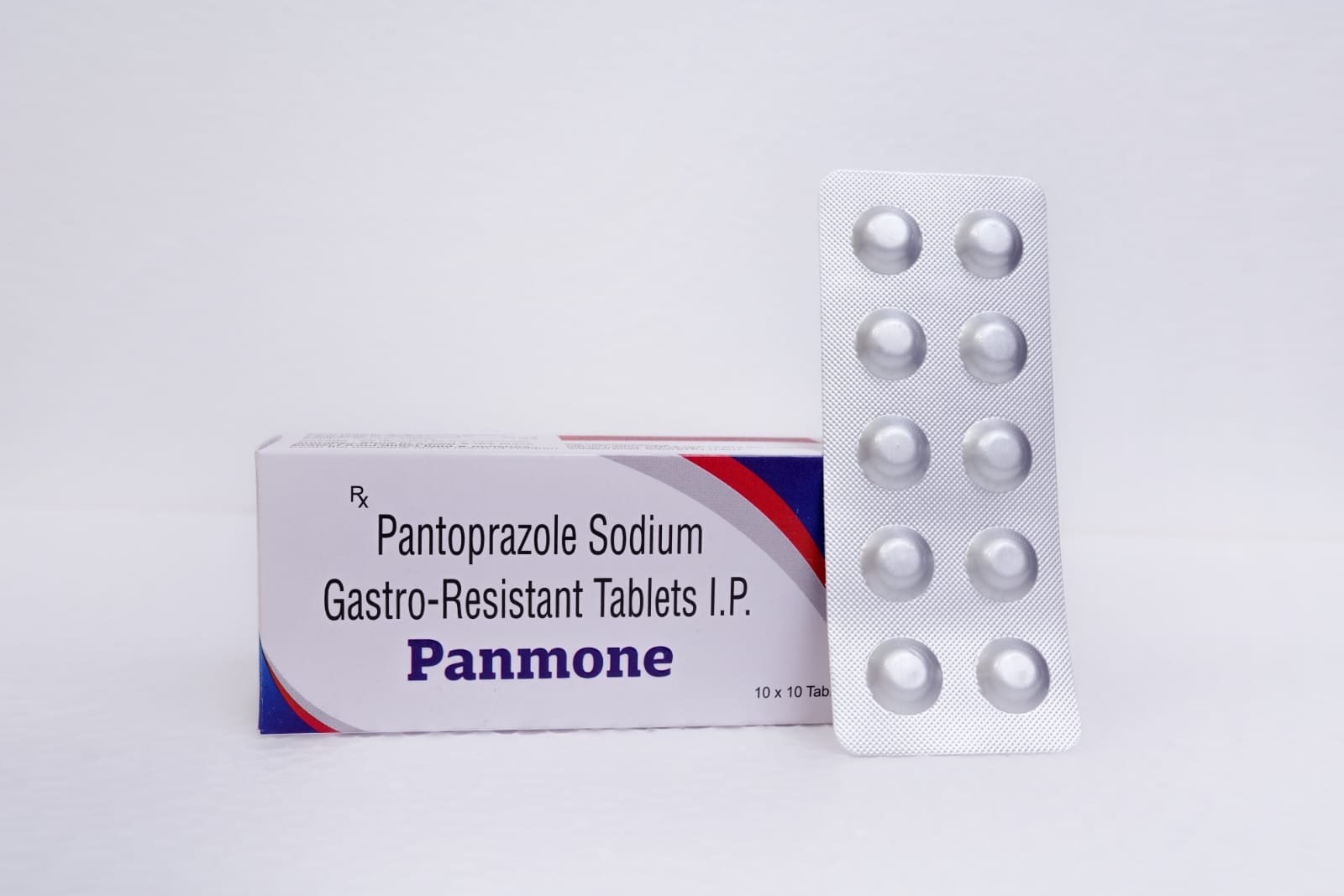
PANMONE
Pantaprazole Sodium Gastro-resistant (Entric Coated) Tablet
Pantoprazole Sodium Gastro-resistant (Enteric Coated) Tablet is a medication used primarily for the treatment of conditions related to excessive stomach acid production. The enteric coating ensures that the tablet dissolves in the small intestine rather than the stomach, which protects the active ingredient from stomach acid and prevents potential irritation.
Uses Panmone:

-
Gastroesophageal Reflux Disease (GERD):
Pantoprazole is commonly used to treat GERD, a condition where acid from the stomach flows backward into the esophagus, causing symptoms like heartburn and irritation. It helps to reduce the stomach acid and prevent reflux. Erosive Esophagitis:
This is a condition where the lining of the esophagus is damaged due to acid reflux. Pantoprazole promotes healing of the esophageal lining and reduces inflammation.Peptic Ulcers:
CPantoprazole is used to treat and prevent ulcers in the stomach and duodenum. It reduces the amount of acid in the stomach, which allows the ulcers to heal.Helicobacter pylori Eradication:
When combined with antibiotics, Pantoprazole is used as part of a treatment regimen to eradicate Helicobacter pylori (H. pylori), a bacterium that can cause peptic ulcers.Zollinger-Ellison Syndrome:
This is a rare condition where tumors in the pancreas or duodenum cause excessive acid production. Pantoprazole helps control the excess acid.Prevention of Upper Gastrointestinal Bleeding:
In some cases, Pantoprazole is used to prevent bleeding in patients with a history of bleeding ulcers or in patients undergoing certain medical procedures (e.g., endoscopy) to reduce the risk of complications.Short-term Treatment of Gastric and Duodenal Ulcers:
Pantoprazole can be prescribed for short-term treatment to help heal and manage ulcers caused by excessive acid production.Prevention of Gastric Ulcers due to NSAID Use:
It is sometimes prescribed for people who take nonsteroidal anti-inflammatory drugs (NSAIDs) long-term, as these drugs can increase the risk of stomach ulcers. Pantoprazole helps prevent ulcer formation in the stomach.

How it works:
Pantoprazole works by inhibiting the proton pump, which is responsible for the secretion of gastric acid in the stomach. By reducing acid production, it helps heal ulcers, alleviates symptoms of acid reflux, and protects against damage caused by excessive stomach acid
Dosage:
The dosage of Pantoprazole depends on the condition being treated, the patient's age, and overall health. Below are the general dosing recommendations for various conditions:
Gastroesophageal Reflux Disease (GERD):
Standard dose: 40 mg once daily.
Duration: Treatment typically lasts for 4 to 8 weeks, depending on the severity of symptoms. Some individuals may require long-term maintenance therapy, but the dose may be reduced to 20 mg per day.
>Erosive Esophagitis (due to GERD):
Standard dose: 40 mg once daily.
Duration: 4 to 8 weeks of therapy, depending on the severity of esophagitis. Some people may require longer treatment based on medical advice.
Peptic Ulcers:
Standard dose: 40 mg once daily, usually for 2 to 4 weeks.
Maintenance dose: Sometimes, a lower dose of 20 mg per day may be recommended for prevention of recurrence.
Helicobacter pylori Eradication (with antibiotics):
Standard dose: 40 mg once daily, often for 10 to 14 days, in combination with specific antibiotics (e.g., clarithromycin and amoxicillin or metronidazole) to eradicate Helicobacter pylori.
Zollinger-Ellison Syndrome:
Initial dose: 40 mg twice daily (morning and evening).
Maintenance dose: The dosage may be adjusted based on individual response and severity of the condition. It can range from 40 mg twice daily to higher doses, sometimes up to 240 mg daily, depending on the patient's needs.
Prevention of Gastric Ulcers Due to NSAIDs:
Standard dose: 20 mg once daily
Possible Side Effects:
Common side effects: Diarrhea, constipation, stomach pain, or nausea.
Precautions:
Mild side effects like headache or nausea may resolve as your body adjusts to the medication. If these persist or worsen, contact your doctor.
For serious side effects such as severe allergic reactions, liver problems, or severe diarrhea, seek immediate medical attention.
